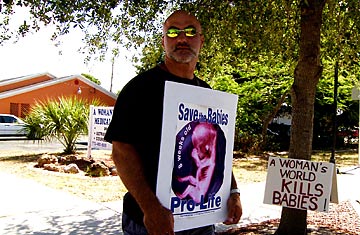
A scene from HBO's 12th and Delaware
The newest front line in America's abortion wars can be seen from a Fort Pierce, Fla., street corner. On one side, there's an abortion clinic named A Woman's World. On the other is the Pregnancy Care Center, one of the more than 4,000 crisis pregnancy centers (CPCs) in the U.S., whose pro-life goal is to help women find alternatives to abortion. The various strategies the Pregnancy Care Center uses to persuade clients to continue an unintended or unwanted pregnancy are the subject of a provocative new HBO documentary, 12th and Delaware, co-directed by Rachel Grady and Heidi Ewing, Oscar nominees for their 2006 documentary Jesus Camp.
Recent estimates indicate there are now more than five times as many CPCs in the U.S. as there are abortion clinics. And many are in close proximity: one Kansas City, Mo., abortion clinic even shares a wall with a CPC. Both types of clinics are often vaguely named, and women setting out to go to an abortion provider sometimes mistakenly walk into a CPC. Many CPCs offer comprehensive adoption counseling and financial aid or supplies to help a woman raise a baby she decides to keep.
While 12th and Delaware refrains from taking a position on CPCs, it shows what some view as manipulative practices to influence prospective mothers — describing abortion practices in vivid detail, for example, or writing "Hi, Mommy" on an ultrasound. The center "uses a lot of alarming, scary language and photographs that you don't typically see in a doctor's office," says Grady. "If I was an 18-year-old girl that was in crisis, that would really scare me."
The film coincides with accelerated efforts this summer to monitor pro-life centers' advertising. In late June, Representative Carolyn Maloney of New York and Senator Bob Menendez of New Jersey, both Democrats, reintroduced a bill to prohibit CPCs from portraying themselves as abortion providers and then pulling a bait and switch once clients get into the clinic. According to NARAL Pro-Choice America, an estimated 2.5% of CPCs falsely advertise their services on online sites like Yellowpages.com and Superpages.com. But even that small fraction was big enough to motivate NARAL to launch a campaign this summer to try to ensure that such ads are not included under abortion services or referrals, nor as medical clinics unless they are medically licensed facilities.
In counseling pregnant women, CPCs frequently highlight the potential long-term risks of abortion to women's health. Heartbeat International, one of the biggest CPC organizations, points to a 2009 study, co-authored by prestigious National Cancer Institute scholar Dr. Louise Brinton, that indicates induced abortion increases a woman's risk of breast cancer. Pro-choice groups like NARAL counter that there is far from a medical consensus on the subject and accuse the CPCs of cherry-picking from such studies in order to scare women out of getting abortions.
NARAL's Virginia chapter published a report this year documenting a yearlong undercover investigation that found that 67% of CPCs in the state gave women some kind of inaccurate or misleading medical information, such as "All condoms have flaws or holes" or "Using a condom does not protect you from AIDS or pregnancy." NARAL took its report to the University of Mary Washington, in Fredericksburg, Va., where students proposed a bill to require CPCs to disclose their pro-life agenda in their ads in campus publications. NARAL also sought to ensure that CPC information was not listed on the website for the school's women's clinic. Today, only pro-choice information is provided, although officials at Mary Washington say the change was not motivated by NARAL's claims. This fall, NARAL will take its campaign to three other Virginia schools: the University of Virginia, James Madison University and Hollins University.
But NARAL has had less success in persuading state lawmakers to crack down on questionable CPC tactics. Virginia legislators disputed the NARAL report's methodology and dismissed a bill to regulate CPCs. Instead, Virginia passed a resolution praising pregnancy resource centers for their integrity and for the $1.1 million in resources that Virginia centers gave to women in crisis last year, including 8,000 bags of diapers and 3,800 classes on topics ranging from infant care to job-search skills.
CareNet, one of America's largest CPC organizations, says its staff works with local centers to ensure that advertising meets honesty requirements and makes clear Carenet does not offer abortion services. The group's president, Melinda Delahoyde, says CareNet's 32,000 volunteers seek to convey an empowering spirit of love, not fear, in its advertising and in the medical options presented to women. "Yes, we believe in life, but whatever choice she makes, she is always welcome back," says Delahoyde. "God is not a god of fear — we want every person who walks in our centers to feel that. We do that through our volunteer training, through our manuals, through our regional consultants, through our national staff." Moreover, CareNet says, its exit interviews regularly show higher than 95% client satisfaction.
While the Pregnancy Care Center featured in the film declined to speak with TIME, its leadership assured Heartbeat that as an affiliated center, it complies with Heartbeat's principles of integrity and compassion. "12th and Delaware is another example of out-of-context video manipulation of the type that victimized Shirley Sherrod just recently. This time the victim was our Heartbeat affiliate Pregnancy Care Center," Heartbeat International President Peggy Hartshorn tells TIME. "We are eager to provide the truth to women."
